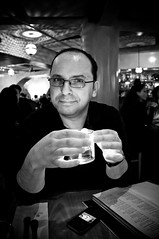new sensation

"Why don't you just put some clippings together, get a press pass, get in legitimately?" He is obviously more straight laced than I am. I haven't sneaked into anything yet, that's for later tonight, after dinner, but even the idea of breaking the rules is making him nervous. I offer that I haven't kept track of my work. I try to spin it like it's an airy topic, as if there's no reason I would care, a faint mask of a ditzy girl, but he knows better, he presses, and so, uncharacteristically, I lay it all out. Everything. My project, what happened to it, how it failed, how it ended my life, how I've only just barely scraped by, that I bitterly swept my work away, deleted all of my writing in a harsh wind of regret and hate. This is the first time I've ever admitted what I did. He offers very little in the way of commentary, except to occasionally ask small questions, the better to clarify details, and allow me pauses to pick at my food. He is an exceptional listener. I am struck by his understanding, how immediately he grasps the heart of the thing. I think, "This is why he has me, absolutely completely. He is the rarest of creatures, one who not only looks, but sees."
"That must be impossibly hard," he says, "How do you survive?" "I don't," I reply, and he nods, "Of course." He looks at me as if I am a wonder, a myth. He says, "It is incredible that you can bear it, that you don't fall apart." Gently, he teases more from me, as if delicately pulling threads from a loom. I am Penelope, the faithful wife of Odysseus, unraveling at his feet, spilling everything across the table. He describes how he thinks it must be, mentions the word brittle, and it is so accurate I almost cry, but not quite. He keeps me balanced, he keeps me safe. It is amazing. "So this is part of the shadow underneath your skin."
When I am done my story, terrible in all its grand detail, he sits a moment, somber. "I understand why you stopped writing." A rush of heat, not quite anger, flushes up my throat, "I wouldn't have stopped unless I had a good reason." It tastes bitter. What sort of person does he think I am? But then he continues, "So. This is the point where if I were to answer as a woman, I would offer a similar story about my life, the better to offer empathy and make you feel less alone. Shared understanding, emotional community support." I laugh. "I don't think you have anything like that." "No," he says, "not really." He gestures, one hand, then the other, not quite smiling. "Or, if I were to answer as a man, this is where I would try to offer a solution, something constructive, to address and fix your problems. Make everything better." I am blinded by adoration. This is precisely the sort of reply I have always needed, but never been given. Just like that, I am relieved of my burden. He is sublime. "Which kind of answer would you prefer goes first?"